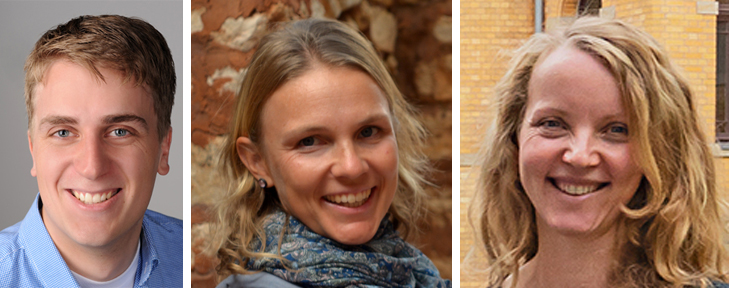We gladly announce that three new members joined the MSCJ! Welcome on board!
From left to right: Prof. Dr. Alexander Breuer (FSU: Faculty of Mathematics and Computer Science), Dr. Sophie Biskop (FSU: Faculty of Chemistry and Earth Sciences), and Dr. Denise Kühnert (MPI for the Science of Human Histrory).
Prof. Dr. Alexander Breuer’s work tackles computationally demanding challenges in research and industry. His work covers the involved disciplines from the bare metal of computer architectures to fully automated production workflows by integrating modeling and simulation, high-performance computing, software engineering, data analytics, and verification and validation. This overarching approach is key for building visionary, transferable, robust and efficient software pipelines.
In 2014, Prof. Breuer was honored with an ACM/IEEE-CS George Michael Memorial HPC Fellowship for his Ph.D. project “High Performance Earthquake Simulations”. In addition, he and his collaborators have been awarded with the PRACE ISC Award and nominated as ACM Gordon Bell finalists.
Prof. Breuer holds a doctoral degree from the Technical University of Munich and currently leads the Scalable Data- and Compute-intensive Analyses lab at FSU Jena.
As a geographer, the research interests of Dr. Sophie Biskop focus on the quantification and assessment of climate change impacts on the hydrology in high mountain regions and the implications on water supply to the downstream lowland areas by integrating hydrological modelling and remote sensing techniques. Her research contributes to a better understanding of spatiotemporal hydrological patterns and water balance changes at a catchment-through-regional scale in order to support sustainable management and planning of water demands in a changing environment.
Dr. Denise Kühnert is an independent Max Planck Research Group Leader at the Max Planck Institute for the Science of Human History. She leads the Transmission, Infection, Diversification & Evolution Group (tide). The tide group develops and applies phylogenetic approaches to address scientific questions at the interface of mathematical epidemiology, evolution, ecology and infectious diseases.
